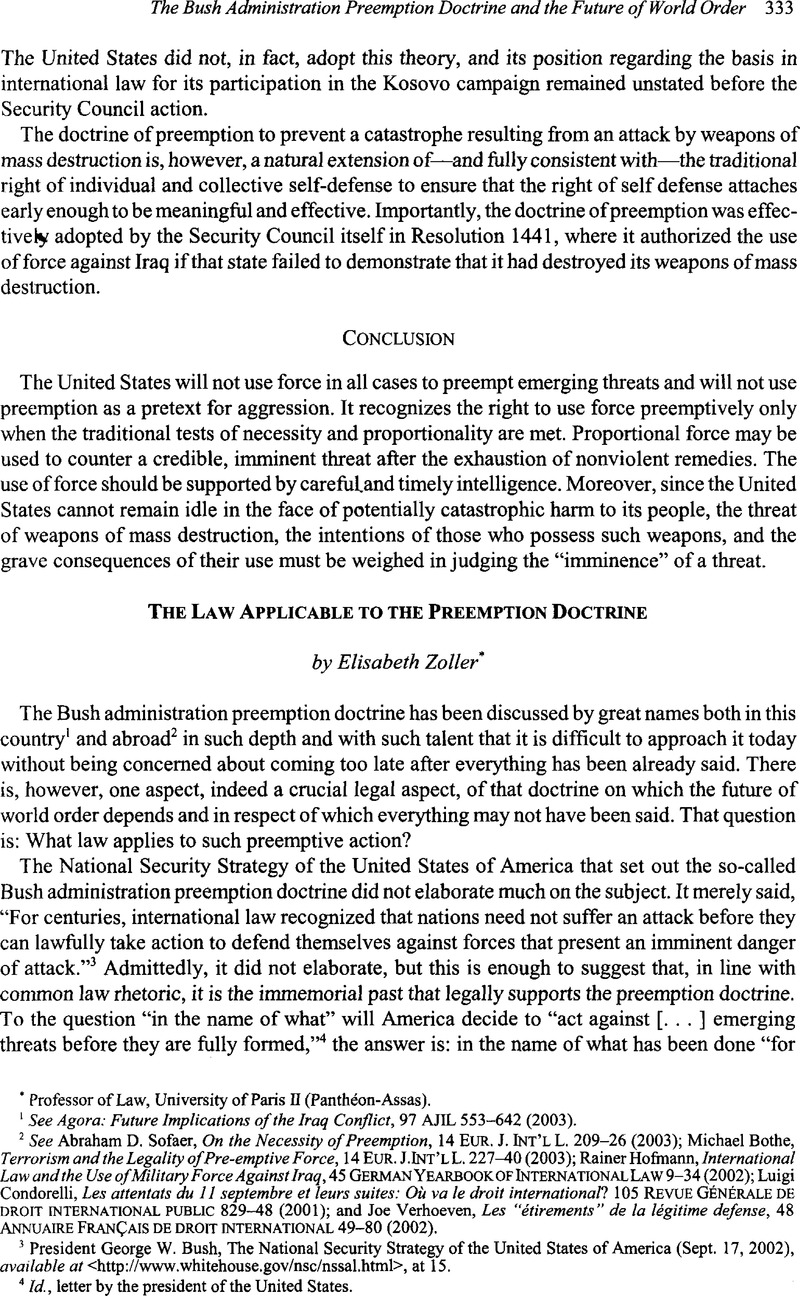Article contents
The Law Applicable to the Preemption Doctrine
Published online by Cambridge University Press: 28 February 2017
Abstract

Information
- Type
- The Bush Administration Preemption Doctrine and the Future of World Order
- Information
- Copyright
- Copyright © American Society of International Law 2004
References
1 See Agora: Future Implications of the Iraq Conflict, 97 AJ1L 553-642 (2003).
2 See Sofaer, Abraham D., On the Necessity of Preemption, 14 Eur. J. Int’l L. 209-26 (2003)CrossRefGoogle Scholar; Bothe, Michael, Terrorism and the Legality of Pre-emptive Force, 14 Em. J. Int’l L. 227-40 (2003)Google Scholar; Hofmann, Rainer, International Law and the Use of Military Force Against Iraq, 45 German Yearbook of International Law 9–34 (2002)Google Scholar; Condorelli, Luigi, Les attentats du II septembre et leurs suites: Où va le droit international’? 105 Revue GéNérale de Droit International Public 829-48 (2001)Google Scholar; and Verhoeven, Joe, Les “étirements” de la légitime defense, 48 Annuaire Fran×ais de Droit International 49–80 (2002)CrossRefGoogle Scholar.
3 President George W. Bush, The National Security Strategy of the United States of America (Sept. 17, 2002), available at <http://www.whitehouse.gov/nsc/nssal.html>, at 15.
4 Id., letter by the president of the United States.
5 Military and Paramilitary Activities (Nicaragua v. U.S.), Merits, 1986 ICJ Rep. 14 (June 27).
6 Id., at 94, §176.
7 Moore, 2 Digest of International Law 412 (1906).
8 Nicaragua, supra note 5, at 103, §194.
9 Id. at 96-97, §181.
10 Id. at 103, §195.
11 Id. at 103, §195 (“Dans le cas de la légitime défense individuelle, ce droit ne peut être exercé que si l’Etat intéressé a été victime d’une agression armée.”) (emphasis added).
12 Case Concerning Oil Platforms (Islamic Republic of Iran v. United States), Merits, 2003 ICJ Rep. 27, §51 (electronic version).
13 See I Alexis De Tocqueville, Democracy in America II at 307 (Arthur Goldhammer trans. 2004): “The English and Americans have retained the law of precedents. In other words, they continue to base their legal opinions and judicial opinions on the opinions and decisions of their forebears. Therefore, an English or American lawyer almost always combines a taste and respect for what is old with a liking for what is regular and legal. This influences the legal spirit in yet another way, and consequently the course of the society as well. The English or American lawyer investigates what was done, the French lawyer what was most likely intended. One wants decisions; the other, reasons.”
14 Legal Consequences for States of the Continued Presence of South Africa in Namibia (South West Africa) notwithstanding Security Council Resolution 276 (1970), Advisory Opinion, 1971 ICJ Rep. 16, at 47, §94.
15 See The National Security Strategy, supra note 3, at 15.
16 Taft, William H. IV & Buchwald, Todd F., Preemption, Iraq, and International Law, 97 AJIL 557, 567-71 (2003)Google Scholar.
17 Certain Expenses of the United Nations (Article 17, para. 2 of the Charter), Advisory Opinion, 1962 ICJ Rep. 151, 168.
18 [Jean-Jacques Rousseau, The Social Contract Or Principles of Political Right Ch. 3 at 19 (Donald A. Cress trans. 1983) (1762).
- 3
- Cited by

